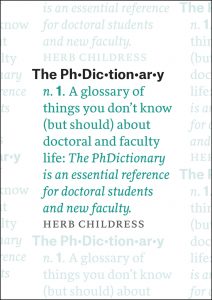Herb Childress on the path from first-generation college student to scholar

An excerpt from Herb Childress, author of The PhDictionary: A Glossary of Things You Don’t Know (But Should) about Doctoral and Faculty Life, from his recent Inside Higher Ed piece, “The Confessions—and Confusions—of a First-Generation Scholar,” follows below.
***
I graduated with my undergraduate degree in 1989, at the age of 31. Had I come from a college family, I’d have finished my Ph.D. by the time I was 31. Had I come from an academic family, I’d have had half a chance of being tenured at 31. But it was OK. I had a bachelor’s degree in architecture and a deep longing to be adopted into the community of scholars. I knew what the holy land felt like. I knew where I wanted to live.
But it was truly an immigration, an exchange of one citizenship for another. As I went on through my graduate education, I became a class traitor: a source of pride, confusion, envy and intimidation among family and neighbors who once had been natural allies. My family understood that I wanted to become a “college teacher,” but not why studying teenagers’ parking lot hangouts or bedroom personalization was related to architecture. I have come from a culture in which a question like “What’s that book about?” has a singular and brief answer. I had become an ecosystems thinker in a land of A-B mechanical causality.
Every first-generation scholar becomes the butt of jokes about not knowing how to do some task like replace a toilet gasket or stack firewood, how to make a good pie crust or a tortilla, because our labor doesn’t really look like labor. Our siblings become self-conscious in our presence about their use of language. Our furniture is different than theirs. Our car is different than theirs. Our television habits are different than theirs. We buy books instead of fishing gear. We have soft hands. We have become, against our own will, a member of that class of people who once made them feel dumb and have the potential to do so again.
A friend about my age, now also in higher education, grew up with two younger sisters in a family headed by their mother, a waitress. When it became evident during high school that he was interested in reading and ideas and political engagement, his younger sisters began calling him Grey Poupon, after the then-current mustard commercial featuring two chauffeured swells on a picnic. It was the easiest language his sisters had access to for the fact that they felt he was aspiring above his station. Garrison Keillor provides more direct language when he says that the Midwestern Lutheran parenting motto was “Keep your voices down and don’t think you’re something special because you’re not, believe me.”
But as with any immigrant community, naturalized scholars are never quite welcome in their new homeland, either. We study the habits, master the vocabulary, serve on yet another committee. We make sure that our work is immaculate, beyond every expectation. Anything less leaves us exposed and endangered. We take nothing for granted; we always think our cover will be blown, our ruse revealed, our passport revoked. My first-generation colleagues tell me that they can never allow themselves to be seen as “that farm girl,” the former truck driver or warehouseman, pretending to be scholars like little children wearing their parents’ shoes. We master the camouflage that keeps us hidden and safe. We smooth out our jarring regional accents, stop telling jokes, take up skiing rather than snowmobiling. We are double agents.
***
To read Childress’s piece in full at Inside Higher Ed, click here.
To read more about The PhDictionary, click here.